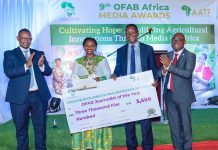By Duncan Mboyah
Kenya plans to use science, technology, and innovation to transform Arid and Semi-Arid Lands (ASALs) to productive agricultural areas.
Prof. Shaukat Abdulrazak, principal secretary in the State Department for Science, Research, and Innovation in the Office of the Prime Cabinet Secretary said that Kenya continues to grapple with a prolonged and intensifying drought crisis in ASALs, yet the potential of science, technology, and innovation exists.
“Science, technology and innovation offer practical and scalable tools that can transform how we respond to drought, food insecurity, and malnutrition in ASAL regions,” Prof. Abdulrazak said during a dialogue on modern biotechnology in Kenya’s capital of Nairobi.
Prof. Abdulrazak noted that the integration of these innovations into response strategies will not only build resilience in vulnerable communities but also accelerate sustainable development.
He said that the strategy will save approximately 1.8 million people in these regions who are food insecure and over 500,000 children under the age of five and more than 100,000 pregnant women who are affected by malnutrition.
The official said that the East African nation has embarked on developing climate-resilient crops, enhancing early warning systems, deploying smart water management solutions and improving nutrition through bio-fortified foods to serve the region.
Prof. Abdulrazak lauded the potential of genetically modified organisms (GMOs) to contribute to a food-secure planet, citing sufficient research and history of safe use of these products.
Dr. Kiprono Ronoh, principal secretary in the Ministry of Agriculture and Livestock Development, said that Kenya is committed to supporting technologies that help in the improvement of lives and livelihoods.
Dr. Ronoh said that the release of GM cotton is already transforming lives in the country and that plans are at an advanced stage to release GM cassava into the Kenyan market.
Dr. Margaret Karembu, director of The International Service for the Acquisition of Agri-biotech Applications, AfriCenter said that biotechnologies have the potential to improve food security to anchor planetary health across the globe despite raging debate.
Dr. Karembu noted that agribiotech has been responsible for the enhancement of food security, reduction of land use pressure and the reduction of the risk of zoonotic diseases’ spread through the improvement of poultry and livestock health.
She added that the technology has also been safely used in the reduction of human and wildlife conflict, promotion of sustainable agriculture and ecosystem health through reduced use of pesticides, and improvement of biodiversity.
The speakers observed that it is unfortunate that some of the finest innovations are now exposed to dedicated drivers of misinformation and disinformation due to good understanding of the technology.
They noted that these groups are busy influencing delays in accessing beneficial tools, decision-making and investments by twisting the narrative and delaying the adoption of crucial biotechnologies.
The dialogue that was attended by scientists, policymakers and farmers looked into the transformative role of biotechnology in enhancing resilience to climate shocks, supporting nutritional goals, and driving sustainable agri-food systems.
The dialogue also sought to establish truths about key biotechnologies, exploring opportunities that could be harnessed with rapid uptake, and losses that could be incurred with delayed adoption of agricultural biotechnologies.
The event that was convened under the theme ‘Harnessing Biotechnology for Food Security and Planetary Health: Addressing National Challenges and Regional Dynamics’, was organised by the ISAAA AfriCenter, Kenya National Academy of Sciences (KNAS), Kenya Agricultural and Livestock Research Organization (KALRO), National Biosafety Authority (NBA), and Africa Science Dialogue (AfriSD).





